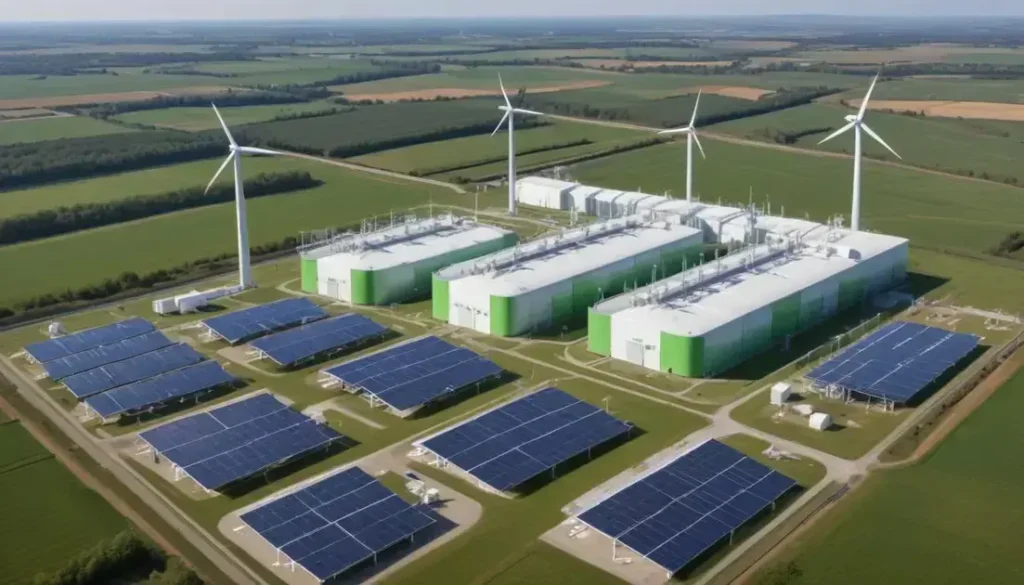Artificial Intelligence (AI) plays a pivotal role in enhancing sustainability by optimizing resource management, improving energy efficiency, and enabling innovative agricultural practices, thereby addressing critical environmental challenges while promoting economic growth.
In today’s evolving landscape, AI in energy is playing a crucial role in transforming sustainability. This article explores the strategic collaboration between TotalEnergies and Mistral AI, highlighting their innovative approaches and potential impacts. Are you ready to learn how this partnership might reshape the energy sector?
Introduction to TotalEnergies and Mistral AI partnership
The partnership between TotalEnergies and Mistral AI marks a significant step towards the integration of advanced technologies in the energy sector. TotalEnergies, a leader in the global energy landscape, is committed to sustainability and innovation. Meanwhile, Mistral AI, known for its cutting-edge AI solutions, brings expertise that can enhance TotalEnergies’ operational efficiencies.
This collaboration aims to leverage artificial intelligence to optimize energy production and distribution. By utilizing AI-driven models, both companies can analyze vast datasets, leading to smarter decision-making processes. This approach not only reduces operational costs but also promotes a more sustainable energy framework.
Furthermore, the initiative includes establishing a joint innovation laboratory that will focus on developing AI tools specifically designed for energy transition. These tools are expected to facilitate data processing in real-time, enhancing predictive capabilities that are crucial for managing renewable energy sources effectively.
The synergy between TotalEnergies and Mistral AI exemplifies how traditional sectors can embrace cutting-edge technology to meet future challenges. This partnership is poised to redefine operational paradigms and set a benchmark for sustainability in the energy industry.
The role of AI in renewable energy
The role of AI in renewable energy is becoming increasingly pivotal as the world shifts towards sustainable solutions. By harnessing the power of artificial intelligence, energy providers can enhance efficiencies and minimize waste in energy production. AI facilitates the management of renewable resources, ensuring optimal use of solar, wind, and hydro power.
AI technology plays a vital role in predicting energy supply and demand. Through advanced analytics and real-time data processing, AI models can forecast energy needs, helping utilities balance loads effectively. This predictive capability leads to a significant reduction in energy losses and improves the overall reliability of power supply.
Moreover, AI assists in integrating renewable energy sources into the existing grid. Machine learning algorithms enable smart grids to adapt to varying energy inputs from renewable sources, enhancing grid stability. This integration ensures that renewable energy can be used efficiently, reducing dependency on fossil fuels.
Additionally, AI-driven solutions provide insights into maintenance needs for renewable energy installations. Predictive maintenance can identify potential failures before they occur, thereby minimizing downtime and repair costs. Overall, AI serves as a key enabler of the transition towards a more sustainable energy future.
Impact on carbon footprint reduction
The partnership between TotalEnergies and Mistral AI aims to significantly impact carbon footprint reduction. By incorporating artificial intelligence into their operations, both companies are poised to streamline processes and minimize greenhouse gas emissions. AI technologies enable better analytics and decision-making, which are crucial for identifying inefficiencies in energy production.
Through advanced data analysis, AI can optimize energy usage patterns, leading to reduced waste and lower carbon outputs. For instance, predictive algorithms can forecast energy demands, ensuring that renewable energy sources are utilized effectively while minimizing reliance on fossil fuels.
Additionally, AI applications help businesses monitor their emissions in real-time. This capability allows for quick adjustments in operations, ensuring compliance with environmental regulations and contributing to a smaller overall carbon footprint. For TotalEnergies and Mistral AI, these methods represent a proactive approach to sustainability.
Moreover, the integration of AI into energy systems fosters innovation in carbon capture technologies, enabling industries to develop solutions that can mitigate emissions at the source. As the combined efforts of both companies unfold, the potential for significant advancements in reducing global carbon footprints becomes clearer, setting a new standard in the energy sector.
Joint innovation laboratory details
The establishment of a joint innovation laboratory by TotalEnergies and Mistral AI signifies a groundbreaking approach to energy technology development. This collaborative space is designed to foster creativity and experimentation in artificial intelligence applications within the energy sector. The laboratory aims to create tailored AI tools that enhance operational efficiencies and address sustainability challenges.
Equipped with advanced technology and expertise, the laboratory will focus on developing innovative solutions for energy management, predictive maintenance, and real-time analytics. By combining resources and knowledge from both companies, this initiative seeks to accelerate the pace of innovation and bring new ideas to the market faster.
One of the key objectives of the joint innovation laboratory is to facilitate cross-disciplinary collaboration. This involves engaging experts from various fields, including data science, engineering, and environmental science, to ensure that solutions are comprehensive and effective. Such collaboration will lead to the creation of AI models that can optimize energy production and maximize the use of renewable resources.
Moreover, the laboratory will serve as a testing ground for new concepts and technologies, allowing for rapid prototyping and validation. This agile approach not only enhances the potential for successful outcomes but also enables both companies to respond swiftly to market demands and remain competitive in the evolving energy landscape.
AI applications in energy sectors
Artificial Intelligence (AI) applications in the energy sector are revolutionizing how energy is generated, distributed, and consumed. By incorporating AI technologies, companies can enhance their operational efficiency and sustainability. One prominent application is in predictive maintenance, where AI algorithms analyze data from equipment to forecast failures before they occur. This approach reduces unnecessary downtime and maintenance costs.
Another significant use of AI is in optimizing energy management. Through smart grids, utilities can leverage AI to adjust energy flow based on real-time consumption patterns. This capability not only ensures a reliable supply but also maximizes the use of renewable energy sources, minimizing reliance on fossil fuels.
AI also plays a critical role in developing demand response systems. By analyzing historical data and current trends, AI helps predict consumption spikes, allowing energy providers to implement strategies that manage load effectively. This proactive approach can lead to significant energy savings and reduced environmental impact.
Moreover, AI facilitates better integration of decentralized energy systems, like solar panels and wind turbines, into the main grid. The adaptability of AI systems allows for efficient stabilization of the grid, ensuring that renewable energy can seamlessly contribute to energy needs. Overall, AI applications are essential for advancing the energy sector towards a more sustainable future.
Benefits for TotalEnergies researchers
TotalEnergies researchers stand to gain significantly from the partnership with Mistral AI. This collaboration provides them access to cutting-edge artificial intelligence tools that can enhance research capabilities. One of the primary benefits is the ability to analyze large datasets rapidly, enabling researchers to derive actionable insights more efficiently.
AI-driven analytics help identify patterns and trends that may go unnoticed through traditional research methods. This capability accelerates the discovery process, leading to faster innovations in energy solutions. By utilizing AI, researchers can focus their efforts on creative problem-solving rather than spending excessive time on data handling.
Furthermore, the partnership fosters an environment of collaboration and knowledge exchange. TotalEnergies researchers can engage with AI specialists at Mistral, enriching their skill sets and broadening their understanding of AI applications in the energy sector. This hands-on experience with cutting-edge technology positions researchers to stay at the forefront of the industry.
Moreover, AI applications can help optimize research methodologies, ensuring that experiments are conducted under ideal conditions. As a result, researchers can achieve more reliable outcomes while also minimizing resource consumption, aligning with sustainability goals. Overall, the benefits of this partnership empower TotalEnergies researchers to push the boundaries of innovation and sustainability in energy.
Decision-support solutions for industries
Decision-support solutions powered by artificial intelligence are transforming industries by providing data-driven insights crucial for strategic planning. These solutions enable companies to analyze vast amounts of data and derive actionable recommendations, enhancing overall efficiency and competitiveness. AI-driven models can process historical data, market trends, and real-time information to forecast scenarios and support informed decision-making.
One significant advantage of AI in decision-support systems is the ability to identify patterns and correlations that human analysts might overlook. For instance, in the energy sector, AI can optimize resource allocation by predicting usage peaks and suggesting operational changes accordingly. This proactive approach minimizes wastage and ensures more efficient energy distribution.
Moreover, decision-support solutions can enhance risk management practices. By employing machine learning algorithms, industries can simulate various scenarios and assess potential outcomes. This allows businesses to gauge the impact of their decisions and adapt strategies in real time, leading to more resilient operations.
Furthermore, integrating decision-support systems into business processes promotes collaboration among teams. By presenting data visually and interactively, stakeholders can engage in discussions based on accurate insights. Overall, AI-powered decision-support solutions empower industries to navigate complexities with confidence, fostering innovation and sustainable growth.
Customer experience enhancements
Enhancing customer experience is a crucial focus for businesses leveraging artificial intelligence. AI technologies enable companies to personalize interactions, streamline services, and respond efficiently to customer inquiries. By utilizing advanced data analytics, businesses can gain insights into customer preferences and behaviors, allowing them to tailor their offerings accordingly.
One significant way AI enhances customer experience is through chatbots and virtual assistants. These AI-driven tools provide immediate responses to customer queries, improving service efficiency and availability. Customers appreciate quick resolutions, leading to higher satisfaction and loyalty. Moreover, chatbots can operate 24/7, ensuring that customers can receive assistance at any time.
AI also enables proactive engagement with customers. By analyzing feedback and behavior patterns, companies can anticipate customer needs and address potential issues before they escalate. This proactive approach fosters a sense of care and attentiveness, strengthening customer relationships.
Furthermore, AI-powered recommendation systems enhance the shopping experience by suggesting products based on previous purchases and browsing history. This personalization not only increases sales but also makes the customer feel valued and understood. Overall, the integration of AI in customer experience strategies creates more meaningful interactions, helping businesses build strong, long-lasting relationships with their customers.
Digital sovereignty in Europe
The concept of digital sovereignty is gaining prominence in Europe as countries seek greater control over their data and digital infrastructure. This movement emphasizes the importance of ensuring that digital services and technologies operate under the governance of local laws, security standards, and ethical guidelines. By fostering digital sovereignty, Europe aims to reduce dependence on non-European technologies and promote self-reliance.
One key aspect of digital sovereignty is the protection of citizen data. Countries are increasingly implementing regulations that require data to be stored and processed within their borders. This approach not only enhances privacy and security but also boosts local economies by supporting domestic tech industries.
Furthermore, digital sovereignty supports the development of frameworks that prioritize ethical technology use. As Europe navigates issues like data privacy, AI bias, and surveillance, ensuring that digital systems reflect democratic values becomes essential. This involves creating regulations that hold tech companies accountable and promote transparency in their operations.
In the context of global competition, digital sovereignty also positions Europe as a leader in digital ethics. By advocating for strong data protection and responsible technology use, European nations can influence international standards and practices, setting a benchmark for digital governance worldwide. Overall, digital sovereignty is crucial for a safer and more equitable digital landscape in Europe.
Past applications of AI by TotalEnergies
TotalEnergies has been at the forefront of utilizing artificial intelligence in various applications aimed at optimizing its operations and enhancing sustainability. One significant application is in predictive maintenance, where AI algorithms analyze data from equipment to predict potential failures before they occur. This proactive approach reduces downtime and maintenance costs, allowing for more efficient operation of energy production facilities.
Additionally, TotalEnergies employs AI in energy management. By analyzing historical consumption patterns and real-time data, AI systems optimize the distribution of energy resources, ensuring that supply meets demand efficiently. This capability not only helps in reducing operational costs but also enhances the company’s commitment to sustainability by minimizing waste.
Moreover, AI has been instrumental in improving safety measures within TotalEnergies’ operations. Machine learning models are used to analyze safety data and predict hazardous situations, enabling the company to implement preventative measures effectively. This focus on safety aligns with TotalEnergies’ aim to maintain a safe working environment for its employees.
Over the years, these applications of AI have allowed TotalEnergies to innovate continuously, positioning the company as a leader in integrating technology with traditional energy practices. As they move forward, the company remains committed to exploring new AI applications that can further enhance operational efficiency and sustainability.
Statements from CEOs Patrick Pouyanné and Arthur Mensch
Statements from CEOs Patrick Pouyanné of TotalEnergies and Arthur Mensch of Mistral AI highlight the transformative potential of their partnership in harnessing artificial intelligence for the energy sector. Patrick Pouyanné emphasizes the necessity of innovation in driving sustainable practices. He articulates that AI will be crucial in optimizing operations and enhancing efficiency in energy production and distribution.
Arthur Mensch, on the other hand, stresses the importance of collaboration between AI and traditional energy practices. He asserts that the integration of advanced machine learning technologies will foster a new era of energy solutions that not only prioritize profitability but also align with environmental goals. Mensch believes that by working together, both companies can create groundbreaking tools that will shape the future of energy.
Both leaders acknowledge the challenges posed by the rapid evolution of technology. However, they are confident that their joint efforts will enable them to overcome these hurdles. Their statements reinforce a shared vision of innovating responsibly while addressing pressing global energy demands.
Moreover, these insights reflect a commitment to not only advance their companies but also contribute positively to the larger societal goals of sustainability and climate action. The collaboration is seen as a pivotal step in redefining how the energy sector can leverage technology for a greener future.
Future prospects of AI in sustainability
The future prospects of artificial intelligence (AI) in sustainability are immensely promising, as this technology continues to evolve and integrate into various sectors. AI is set to play a critical role in addressing pressing environmental challenges, such as climate change, resource depletion, and pollution. By leveraging advanced data analytics, AI can optimize resource management, helping organizations make informed decisions that reduce their ecological footprint.
One significant application of AI in sustainability is its ability to enhance energy efficiency. Smart grids powered by AI can analyze consumption patterns and adjust energy distribution in real time, ensuring that renewable energy sources are utilized effectively. This optimization not only lowers costs but also significantly cuts carbon emissions.
Furthermore, AI technologies are being employed in various fields such as agriculture. Precision farming, powered by AI, allows farmers to monitor crop health, predict yields, and manage water usage efficiently. This helps in promoting sustainable agricultural practices that minimize environmental impact while maximizing productivity.
Additionally, AI can support businesses in achieving their sustainability goals by providing insights into supply chain management. Through predictive analytics, companies can identify inefficiencies and reduce waste, leading to more sustainable operations. Overall, as organizations increasingly adopt AI, its potential to drive sustainability initiatives will become more pronounced, paving the way for a greener future.
In conclusion
Artificial Intelligence (AI) offers incredible opportunities for various sectors, especially in enhancing sustainability. By optimizing processes, improving efficiency, and fostering innovation, AI can help organizations tackle pressing environmental challenges.
As companies like TotalEnergies and Mistral AI demonstrate, integrating AI into operations can lead to more sustainable practices and better decision-making. From energy management to precision farming, the applications of AI are vast and impactful.
To fully realize the benefits of AI in sustainability, businesses should consider gradual implementation. Starting with pilot projects can provide valuable insights and pave the way for larger-scale adoption. This careful approach allows companies to adapt their strategies and make informed decisions based on real-world results.
Overall, AI not only holds the potential to transform industries but also plays a vital role in creating a greener future. Embracing this technology is essential for businesses aiming to thrive in a rapidly changing world.
Frequently Asked Questions
How can AI improve sustainability in businesses?
AI can enhance sustainability by optimizing resource management, reducing waste, and improving energy efficiency in operations.
What are some practical applications of AI in the energy sector?
AI is used in predictive maintenance, energy management, and safety improvements, enabling more efficient energy production and distribution.
How does AI contribute to customer experience?
AI enhances customer experience through personalized interactions, quick responses to queries via chatbots, and analyzing customer data to understand preferences.
What role does AI play in agriculture?
AI supports precision farming by monitoring crop health, predicting yields, and managing water usage efficiently, promoting sustainable agricultural practices.
What are the challenges of implementing AI in industries?
Challenges include data privacy concerns, the need for skilled personnel, and the integration of AI with existing systems. Addressing these challenges is crucial for success.
Is AI technology accessible for small businesses?
Yes, various AI solutions are available that are affordable and scalable, making it easier for small businesses to adopt AI and enhance their operations.


